As far as cybersecurity is concerned, Linux is commonly hailed to have an excellent structure and is highly immune to malware. But that does not imply that it is all immune to threats. With the tremendous increase in targeted attacks, ransomware, and third-party app vulnerabilities, Linux systems also need an effective layer of protection.
Having a good antivirus may assist in avoiding a possible breach and protecting the data in case you are working on a Linux-based server, desktop, or IoT device. Here, in our blog, we will discuss the top antiviruses for Linux, along with their features, performance, and user-friendly tools.
How to Choose the Best Antiviruses for Linux?
Linux can be a safe operating system, yet it is not totally resistant to cyberattacks. The ideal antivirus for a Linux system can vary depending on your daily needs, i.e., home user, developer, or business server. This is how to choose the best one:
- Find Out Your Security Needs: Is it a business network, your PC, or a mail server? Simple scanners could suffice in case of basic protection. But in the case of servers or enterprise systems, you require real-time scanning, malware cleaning, and central administration of fully packed antivirus.
- Real-Time Protection Check: Linux antiviruses allow some to have a manual scan, whereas others have real-time protection to prevent threats before they can cause damage. Choose the one that gives proactive monitoring should you be downloading files regularly or operating on a shared network.
- Search Cross-Platform Detection: Although Linux is not targeted so frequently, potentially malicious files can arrive on an infected Windows or macOS. An effective Linux antivirus must be able to identify and isolate cross-platform malware before it spreads to other devices.
- Interface and Easy to Use: It is not everyone using Linux who is a command-line expert. Select an antivirus with a friendly interface, or UI, or a few simple command-line tools, whichever suits you. Detailed documentation or community support to help a novice is also provided in many antiviruses.
- Resource Efficiency: Linux is a system that is applied in low-resource systems. Ensure that the antivirus you install does not lag your system and take up much memory. Weaker programs are useful in simple environments.
- Frequency of Update and Support: Research to find an antivirus with frequent updates and technical support that is receptive. Frequent revisions to virus definitions protect against newly discovered malware.
List of 10 Best Antiviruses for Linux
1. CrowdStrike Falcon Linux Sensor
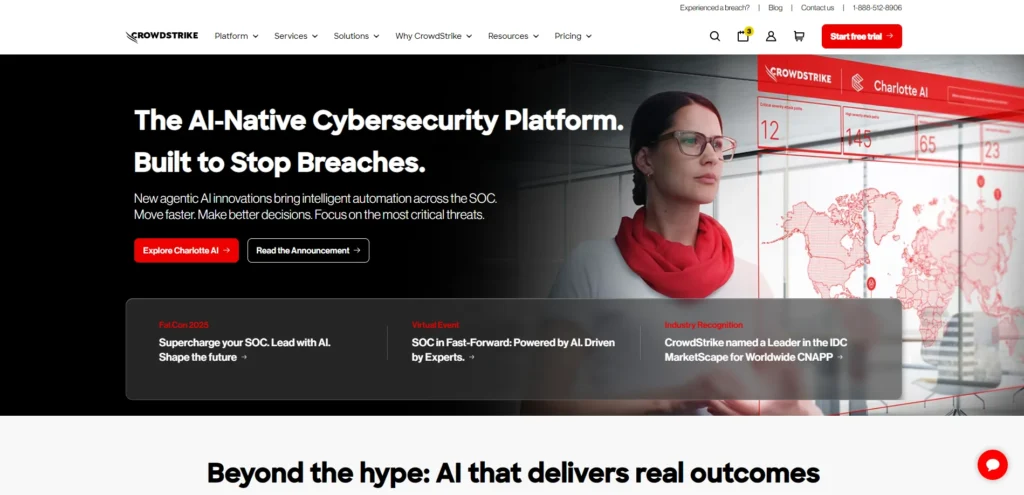
CrowdStrike Falcon is a cloud-driven antivirus and endpoint management software for Linux that targets enterprise-class Linux computers. It provides real-time threat detection, behavior analysis, and strong reports. It runs in the background undetected without slowing down your system. CrowdStrike is an artificial intelligence-based platform for detecting advanced threats and is widely recognized as one of the leading network security solutions for businesses.
It is suitable for companies that want powerful centralized security. It cannot be recommended to casual users, but it can be highly recommended to the company due to its provision of great protection, frequent updates, and its support of large networks and servers.
Price:
- Falcon Go – $59.99/device annually
- Falcon Pro—$99.99/device annually
- Falcon Enterprise—$184.99/device annually
- Falcon Complete MDR—Contact sales for pricing.
Features:
- Cloud-native, lightweight agent for Linux
- Real-time threat detection and response
- AI-powered behavior analysis
- Centralized cloud-based dashboard
- Low resource consumption
- Suitable for large-scale enterprise environments
2. Chkrootkit
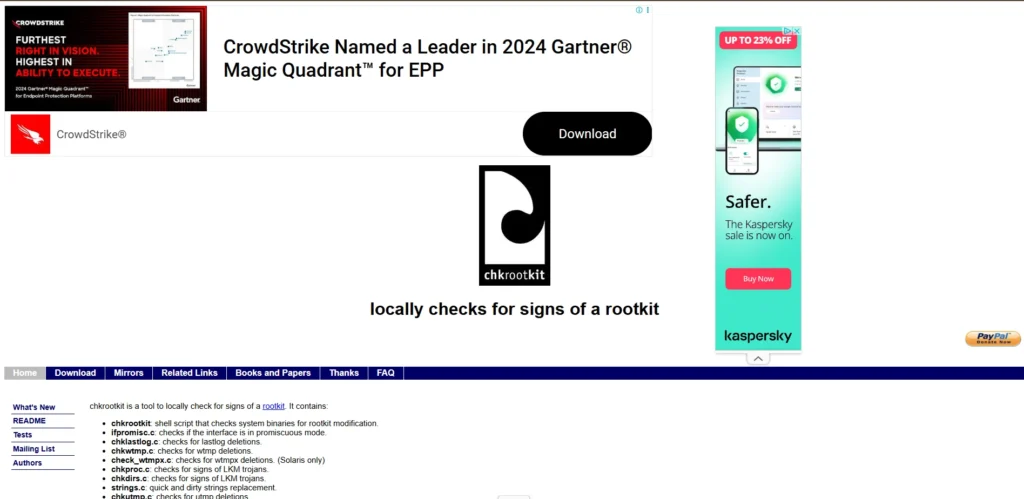
Chkrootkit is a free and open-source program that assists in the detection of rootkits in Linux systems. Rootkits are another form of malware (malicious software) concealed in your system so that they evade detection. chkrootkit searches your system for evidence of hidden files, suspicious programs, and typical rootkit indicators.
It is lightweight and runs through the terminal, which is the reason why it is amazing in older systems or simple systems. Though not real-time protection, it is a great manual tool to run regular checks and add protection to the system.
Price:
- Free
Features:
- Command-line tool for detecting rootkits
- Scans system binaries for known signatures
- Lightweight and open-source
- Detects hidden processes and ports
- Regularly updated rootkit database
- Ideal for manual system health checks
3. Comodo
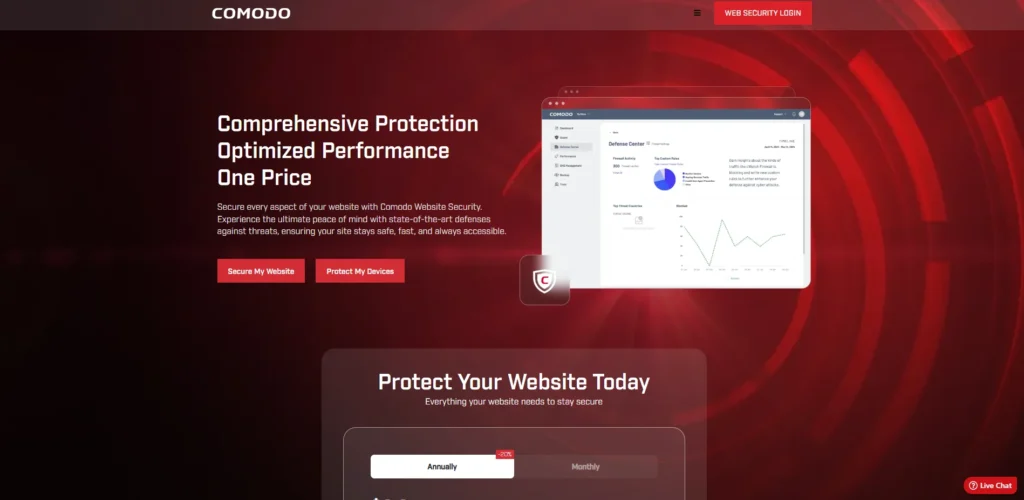
Comodo developed a user-friendly antivirus program that has a graphics interface that is usable by Linux users. It offers real-time checking, mail security, and auto updates. Comodo is excellent as long as you seek a convenient program with good functionality.
It identifies viruses, malware, and worms as well as provides options for quarantine and scanning. It would fit both household users and small companies in need of a free antivirus that would be effective and have regular security updates provided, and community support.
Price:
- Connect with the team
Features:
- Real-time scanning for malware and viruses
- On-access and on-demand scanning
- Email filtering and quarantine options
- GUI and command-line interface available
- Regular virus database updates
- Suitable for home and business use
4. Panda Adaptive Defense
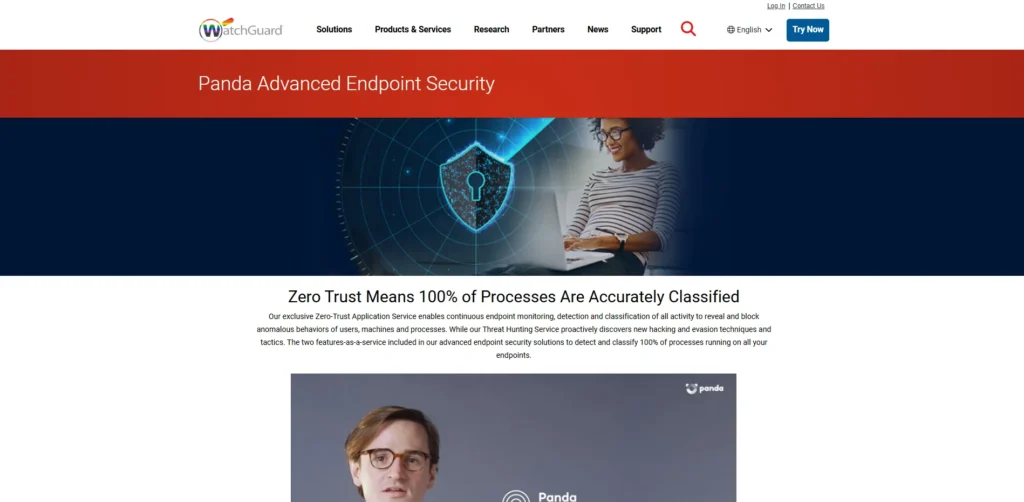
Panda Adaptive Defense is an antivirus software for business performed in the cloud, where traditional protection goes together with complex threat security. It employs the functions of artificial intelligence to observe and examine all running processes, making it one of the advanced AI tools for cybersecurity available today. It is ideal in large businesses, and server architecture provides fine-grained control and threat containment.
It also has real-time protection and cloud management that is easy. It might require a steep learning curve for the uninitiated, but it is superb as far as IT teams and their requirement to gain thorough security insights and manage malware are concerned.
Price:
- Connect with the team
Features:
- Endpoint Detection & Response (EDR) and cloud-based antivirus software
- AI-driven threat detection and analysis
- Real-time monitoring of running applications
- Centralized cloud management console
- Detailed forensic reporting
- Strong enterprise-level security features
5. Avast Core Security
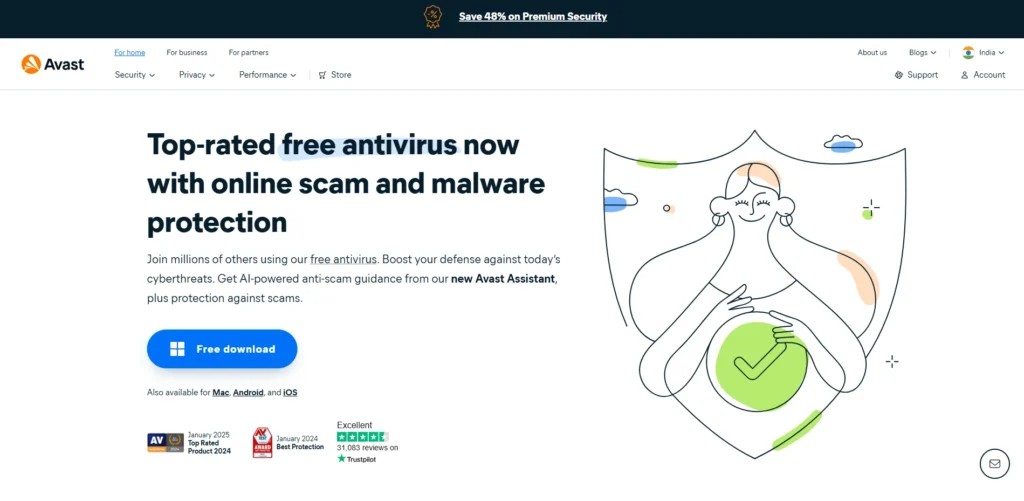
Avast Core Security is a product that provides effective antivirus software for Linux computers, particularly servers. It offers real-time malware detection, scheduled and on-demand scanning, and potent anti-phishing features. It works well for business users who require system protection at all times.
Avast is not heavy, has regular updates, and is easy to install. However, commercial use is not free, but it provides good protection and customer support and so is a reliable option when it comes to secure Linux environments.
Price:
- 1 Windows PC – Rs 1,199 / first year
- 10 Windows devices—Rs 1,599/first year
- 1 Mac – Rs 1,199 / first year
- 10 Mac devices—Rs 1,599/first year
- 10 Android devices—Rs 1,599 / first year
Features:
- Real-time malware protection for Linux servers
- On-demand and scheduled scanning
- Email and network filtering
- Advanced anti-phishing protection
- Centralized management for business environments
- Regular automatic updates
6. Rkhunter
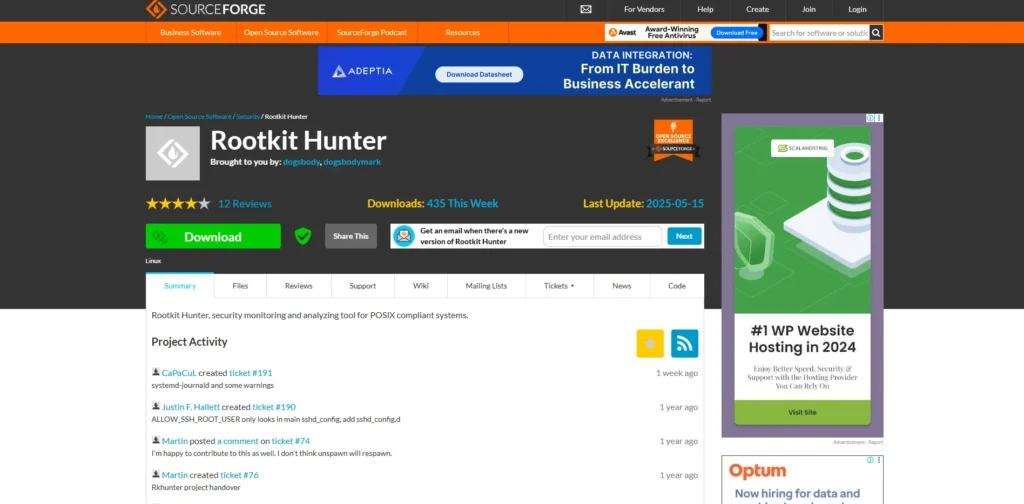
This is also a free, open-source tool that is used to scan Linux-based systems against rootkits and security problems. It scans the file system and binaries in search of suspicious strings, system settings, and hidden files. It can be run on a command line, and it is easy to configure to run periodically.
Similar to chkrootkit, it is not real-time, but it is great at finding early-on stealth threats. It is perfect for a user or sage who is well versed and needs an easy-to-use and efficient security tool.
Price:
- Free
Features:
- Scans for rootkits, backdoors, and exploits
- Checks system binaries and config files
- Lightweight, open-source, terminal-based tool
- Email alerting system for scan results
- Customizable for automated scans
- Great for advanced users and sysadmins
7. Dr.Web Security Space
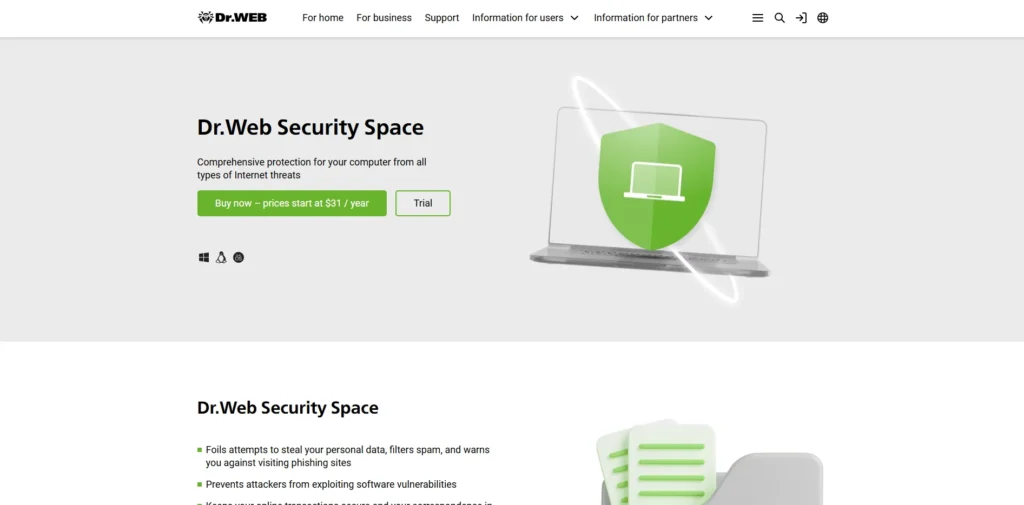
High antivirus protection is offered by Dr.Web Security Space, which places a strong emphasis on prompt threat identification and removal. It includes active threat filtering, email filtering, and real-time scanning. It fits in home desktops as well as business servers. Dr.Web has a user-friendly interface and provides solutions to purge infected files.
New updates keep your system safe against emerging malware. It is a paid instrument, but it is reliable and worth the value.
Price:
- $32.55 for two PCs for a year (VAT excluded)
- 1 Android device / 2 years – €15.80 (including VAT)
Features:
- Comprehensive real-time antivirus scanning
- Email scanning and anti-spam protection
- Automatic updates and quarantine manager
- Protects against ransomware and spyware
- Low system footprint
- Easy integration with Linux desktops and servers
8. McAfee Endpoint Security
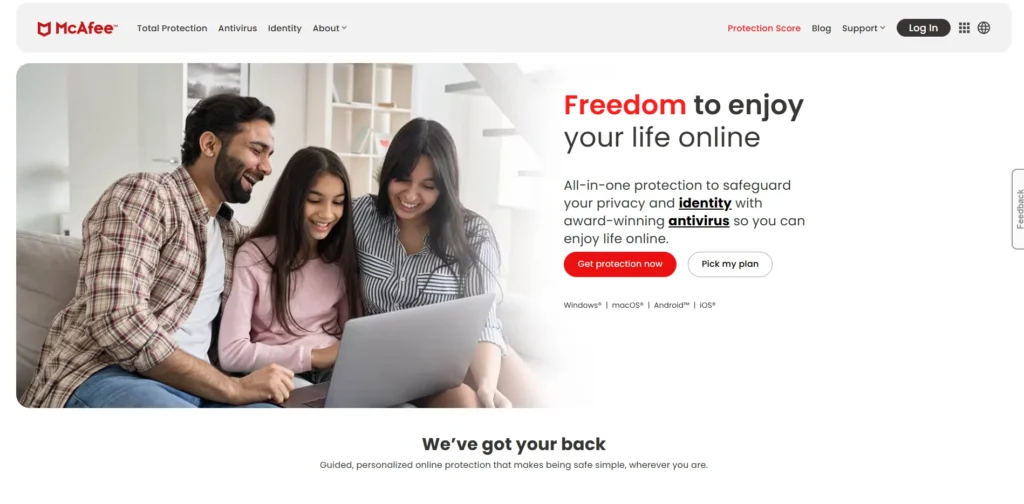
McAfee Endpoint Security is a renowned endpoint security software and antivirus. Its Linux version delivers enterprise-grade capabilities, such as real-time malware protection, central management, and auto updates. It suits companies, especially those geared towards high volume and demands by users of different devices.
Without slowing your system, McAfee runs in the background of your system and safeguards against known and unknown threats. It also comes with firewall functions and threat intelligence, which is a very good solution for corporate and government systems.
Price:
- Premium – 10 Devices – ₹1,699.00 (Introductory price; original price ₹4,999.00)
Features:
- Real-time malware protection and scanning
- Centralized threat management and reporting
- Built-in firewall and web control
- Supports automation and scripting
- Advanced threat intelligence and analysis
- Designed for corporate use
9. ESET NOD32
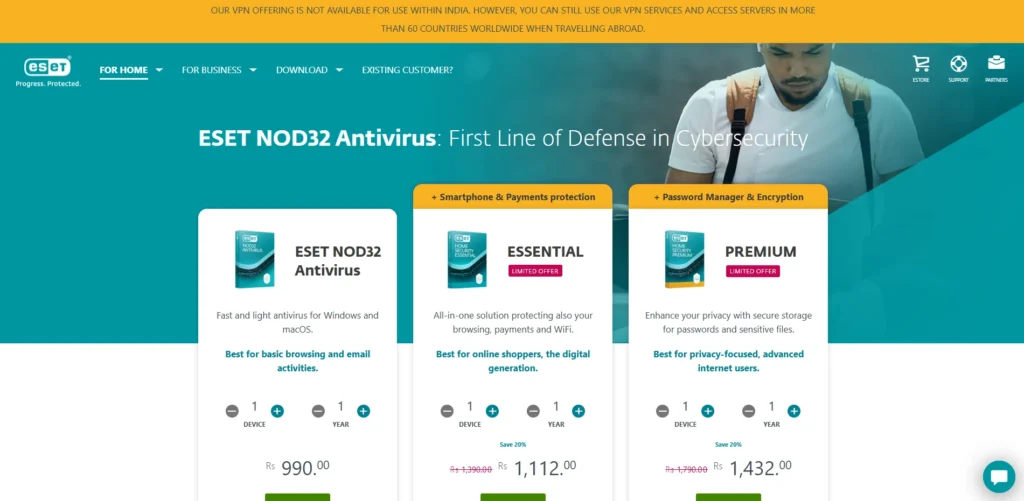
ESET NOD32 Linux is a fast and lightweight antivirus software for Linux with high detection technology. It is fantastic in desktop use where the user requires reliable security but not complicated parameters. ESET also has real-time protection, is regularly updated, and scans Linux malware and cross-platform malware.
The interface is tidy and user-friendly, and it is ideal in small offices and for personal usage. It is not unlimited, but it offers a good deal, including stable support and minimal system overhead.
Price:
- ESET HOME SECURITY ESSENTIAL BOX – Rs 3,284.99 (original price Rs 4,379.99)
- ESET HOME SECURITY PREMIUM BOX – Rs 3,884.99 (original price Rs 5,179.99)
- ESET HOME SECURITY ULTIMATE BOX – Rs 5,390.00
Features:
- Real-time scanning with low system impact
- Cross-platform threat detection
- User-friendly interface with minimal setup
- Frequent updates for malware definitions
- Customizable scanning profiles
- Ideal for desktops and small businesses
10. Kaspersky Next EDR Foundations
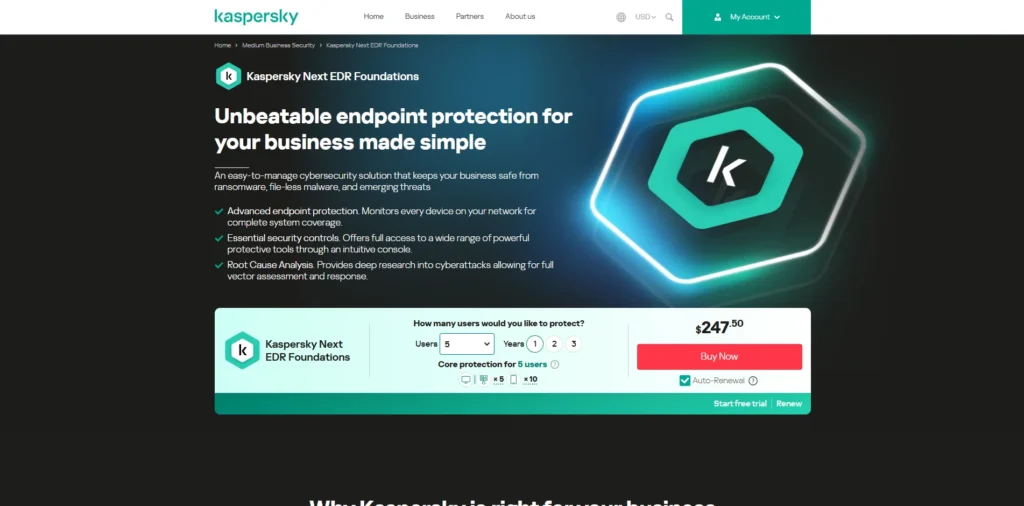
Kaspersky Next EDR Foundations provides high-level security of Linux desktops and servers. It has real-time scanning, firewall integration, web control, and central management. It is most appropriate in applications where an organization has many systems to protect.
Kaspersky Next EDR Foundations employs machine learning and a massive malware database to identify threats fast. It is updated on a regular basis and does not put strain on your system and slow it down. Although it is a paid tool, it presents the best protection, which most businesses and IT people across the world trust.
Price:
- 5 users / 1 year – $247.50
- 10 users / 1 year – $495.00
Features:
- Real-time malware, spyware, and ransomware protection
- Web control and firewall integration
- Centralized management via Kaspersky Security Center
- Uses machine learning for threat detection
- Detailed logging and incident reporting
- Suitable for enterprise Linux environments
Ending Note
As an everyday user or an administrator of a vital network, installing an effective antivirus is an essential step in protecting one or more computers.
You should use the best antivirus software, especially antiviruses for Linux, which depends on what you want: some might provide more real-time protection, and some might give you advanced features and tools to monitor networks or scan for malware.
Solutions that offer assured protection give you peace of mind and keep your system safe in the ever-changing threat landscape. Be active, be safe, and prioritise cybersecurity itself even on Linux. It is an additional precaution for the safety of your system.
FAQs
1. Is Antivirus Really Necessary in Linux Systems?
Although Linux is more secure in concept, it is not free of malwares or rootkits. An antivirus program provides additional protection, and is particularly useful on a server, shared environment or computer with cross-platform files and confidential information.
2. Do Linux Antiviruses Exist Freely?
Yes, such tools as ClamAV, chkrootkit and rkhunter are open-source and free. They provide simple to advanced malware and rootkit awareness, which makes them excellent choices to any lightweight and free protection of Linux machines.
3. Do Linux Anti Viruses Recognize Windows Based Viruses?
Most Linux antiviruses are able to get Windows malware. This aids in preventing infected files through network spreading in an environment with mixed operative systems. It is very helpful to both mail servers and file-sharing systems processing files of Windows origin.
4. What is the Distinction Between Real-Time and On Demand Scanning?
Real-time scanning views your system at all time and prevents threats in real-time. On-demand scanning only scans to see malware when you do a scan manually. Real-time can be best used in day to day business, on-demand is recommendable in periodic scan.
5. Is Antivirus Software Going to Bog Down My Linux System?
The recent Linux based antivirus tools are mostly performance optimized. The lightweight variants cause little impact on the system, particularly when idle. Nonetheless, active scanning can utilize greater resources when scanning, especially on older or lower-powered machines.

